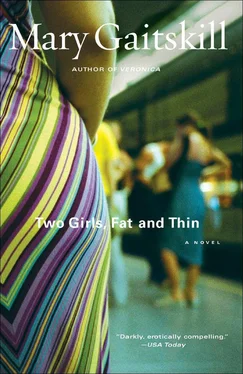Mary Gaitskill - Two Girls, Fat and Thin
Здесь есть возможность читать онлайн «Mary Gaitskill - Two Girls, Fat and Thin» весь текст электронной книги совершенно бесплатно (целиком полную версию без сокращений). В некоторых случаях можно слушать аудио, скачать через торрент в формате fb2 и присутствует краткое содержание. Год выпуска: 2012, Издательство: Simon & Schuster, Жанр: Современная проза, на английском языке. Описание произведения, (предисловие) а так же отзывы посетителей доступны на портале библиотеки ЛибКат.
- Название:Two Girls, Fat and Thin
- Автор:
- Издательство:Simon & Schuster
- Жанр:
- Год:2012
- ISBN:нет данных
- Рейтинг книги:5 / 5. Голосов: 1
-
Избранное:Добавить в избранное
- Отзывы:
-
Ваша оценка:
- 100
- 1
- 2
- 3
- 4
- 5
Two Girls, Fat and Thin: краткое содержание, описание и аннотация
Предлагаем к чтению аннотацию, описание, краткое содержание или предисловие (зависит от того, что написал сам автор книги «Two Girls, Fat and Thin»). Если вы не нашли необходимую информацию о книге — напишите в комментариях, мы постараемся отыскать её.
Review) create a haunting and unforgettable journey into the dark side of contemporary life and the deepest recesses of the soul.
Two Girls, Fat and Thin — читать онлайн бесплатно полную книгу (весь текст) целиком
Ниже представлен текст книги, разбитый по страницам. Система сохранения места последней прочитанной страницы, позволяет с удобством читать онлайн бесплатно книгу «Two Girls, Fat and Thin», без необходимости каждый раз заново искать на чём Вы остановились. Поставьте закладку, и сможете в любой момент перейти на страницу, на которой закончили чтение.
Интервал:
Закладка:
One night almost a month after the fight, I called her house. Mrs. Delgado, who had her daughter’s large liquid brown eyes, answered and told me Nona was skiing. I said, “Tell her that Dotty Footie called. Tell her I’m sorry I fought her.”
The next time I met Nona in the hall, I was shocked to see her look directly at me, her eyes holding an almost unbearable expression of receptivity and humanity. “Hi,” she said, and disappeared into the yelling mass of kids. I felt as if I had been stripped of clothing; her second of kindness pierced me and touched a naked private place so unused to contact that I cringed with shame and discomfort, as if a stranger had put a hand down my pants.
And it didn’t stop there. To my dismay, Nona began calling me at home and inviting me out to play. My mother was delighted; even I could see that here was a chance to make a friend. But I didn’t want to. I didn’t want to go out into the barren squares of neighborhood snow and play with this television-beautiful person in a pink ski cap. I didn’t know how.
But I couldn’t refuse, so out I went. A nature walk, a game of catch, a cup of cocoa in Nona’s pink room checkered with photos of rock and TV stars. Our activities were burdensome, tense affairs devoid of the girlish giggling and trash talk I had never learned how to do. I wanted to go back in the house and draw pictures of Never-Never Land elves or listen to a musical with my mother. Strangely, unbelievably, I had the feeling that Nona liked me. In her cautious conversation I sensed discomfort, curiosity, a sense of duty that had somehow been irrevocably triggered by my phone call. But I also sensed actual interest and liking waiting for me to show myself.
I wanted to show myself but I could not. I vainly groped for words that would let her see what I was like, things to say that she would understand. Desperately, I called other children “retards,” “niggers,” and “queers,” something she seemed always ready to do. But when I talked this way, her face would become confused and remote, as if she knew these words from me were lies, and she didn’t understand why I was lying.
The awful climax of our attempted friendship came in early spring, as we were crouched stiffly in my backyard near our shelterless wire fence, moving our naked rubber troll dolls around my mother’s tomato plants. Suddenly, across the Sissels’ exposed yard, I saw Barbara Van Bent and her gang. And they saw us. They paused for a second, registering the shock of seeing Nona in my yard with me. Then they began to yell, “Delgado is a spic! Delgado loves the sweathog!” For a second I saw Nona’s body fractionally withdraw from me; I saw she had been wounded by what they said. I saw her stop and pause. I saw her slowly return to me. I felt her stay by me, defying the other girls. On her face was a look of mild puzzlement, as if she couldn’t imagine what she was doing in this situation.
I began turning down Nona’s invitations, and soon they stopped. She kept looking at me and saying “Hi” in the halls, and this made me so uncomfortable that I avoided her the same way I avoided Barb and her friends.
One day just before school was over, something unusual happened. As I was struggling down the pavement on my way home from school, my fingers sweating around my lunch-box handle, I almost bumped into Barb Van Bent, who was hustling along almost faster than I was. It had been so long since I’d seen her alone, I didn’t recognize her. She was completely different without her group. She seemed relieved when she turned and saw it was only me coming up behind her; her eyes had been uncharacteristically wide with terror. “Hi,” she said.
I was so nonplussed I fell into step with her, and we walked at breakneck speed in sweating silence.
“Did you see Donnelly back there?” she asked. She meant her friend Marsha.
I hadn’t.
“She says she’s gonna beat my butt,” explained Barb. “That Jew bag.”
This was a very interesting idea and an altogether plausible one. Barb was a big girl, but Marsha was bigger, with huge, frozen-hamhock hands and tiny, brainlessly sparkling eyes flanking a giant nose that looked like it could live independent of her face. What was strange was that Barb should tell me about this. Was it a weird form of companionship? Or did she simply have no sense of irony? Did she not care that I saw she was even more cowardly than I?
Bewildered into silence, I listened to her describe Marsha’s hideous body and warped personality. “. and she’s got pimples on her butt and holes in her underwear,” she said. “And she’s a bitch. Do you know what she’d do?” Barb paused while a tiny kindergartner came within range and addressed herself to him. “She’d say, ‘Get out of here you nigger lips or I’ll beat your butt.’” The child fled. “That’s what she’s like,” finished Barb.
By the next day she must’ve decided these qualities weren’t so bad, because I saw them in the cafeteria together, giggling over their lunch boxes.
Summer came, and I didn’t have to be afraid anymore. I never went out of the house. I stayed down in the basement rec room all day watching Dialing for Dollars and eating Sara Lee cheesecake, bags of potato chips, and diet pop. When that was over I’d watch the gladiator movie and then go upstairs to play with my troll dolls or draw pictures of Tarzan and the Lion Queen. Then I’d sit and talk to my mother while she made dinner, and then we’d eat in the anesthetic wind of three fans trained on the table as we watched Walter Cronkite. My father would walk around, talk. I’d see the kids of the neighborhood wheeling dreamily on their bikes in the lamplight and feel that all was as it should be. They were outside and I was inside. I gained fifteen pounds that summer.
Chapter Nine
When Justine was ten she read a poem about French resisters during the Second World War in her children’s classics book. In it, a French hero was crucified to a barn door with bayonets and tormented by SS men before a crowd of weeping French patriots. The poet dwelt voluptuously on the hero’s torment, and the poem climaxed with the death of the smirking SS captain. It excited her even more than the cartoons that had induced her to make Richie tie her to the swing set. She kept the children’s classics under her bed so she could read it at night with a flashlight and masturbate.
They had moved from Lancelot to Action, Illinois. Richie was no longer at her disposal, and she hadn’t yet found anyone to take his place.
Action was a thriving industrial suburb outside of Chicago. Justine’s father was a successful cardiologist at the Action Medical Center, an interesting building that appeared to be made of plywood and concrete. Her father had told her mother that she couldn’t be his receptionist because they already had a receptionist, so her mother did volunteer work at a center for emotionally disturbed children instead. Their house was a large, wandering, one-story with a flamingo worked into the aluminum grille on the front door.
They had moved there during the summer, when the sidewalks of the new neighborhood were alive with lounging, bicycling, roaming kids. When Justine ventured out onto the pavement, she was accosted by three gum-chewing girls who looked like they were trying to find something wrong with her. But suburban Michigan kids have almost the same laconic, nasal speaking style as the kids of suburban Illinois, and she was immediately accepted into the group.
Justine was drawn to the most sexual of the girls in the neighborhood, Pam Donovan and Edie Bernard, who wore the tightest pants and tightest shirts over their tough little chests. Edie, the blonde, was even sophisticated enough to wear pink powder and black mascara. Although their friends described them as “cute,” they were not pretty. They were skinny and sharp-boned, with sullen, suspicious eyes, thin, violently teased hair, and faces generic to thousands of suburban little girls. But they were made beautiful by the erotic ferocity that suffused their limbs and eyes and lips.
Читать дальшеИнтервал:
Закладка:
Похожие книги на «Two Girls, Fat and Thin»
Представляем Вашему вниманию похожие книги на «Two Girls, Fat and Thin» списком для выбора. Мы отобрали схожую по названию и смыслу литературу в надежде предоставить читателям больше вариантов отыскать новые, интересные, ещё непрочитанные произведения.
Обсуждение, отзывы о книге «Two Girls, Fat and Thin» и просто собственные мнения читателей. Оставьте ваши комментарии, напишите, что Вы думаете о произведении, его смысле или главных героях. Укажите что конкретно понравилось, а что нет, и почему Вы так считаете.












